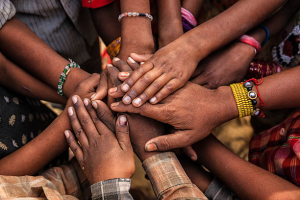September, 2023 African Proverb of the MonthWhen a single finger is cut, all the fingers will have blood. Holoholo (DR Congo and Tanzania) Proverb
 |
Munywe gumo gogukaleke giyase giyagwana mase. (Holoholo) Wakati kidole kimoja kinakatwa, vidole vyote vitakuwa na damu. (Swahili) Lorsqu’un seul doigt est blessé, les autres seront salis par le sang. (French) When a single finger is cut, all the fingers will have blood. (English) |
Holoholo ( DR Congo and Tanzania,) Proverb
Background, Meaning and Everyday Use
Holoholo is a Bantu language of DR Congo and formerly in Tanzania spoken by the Holoholo people on either side of Lake Tanganyika. Classification is uncertain, but it may belong with the Takama group. As of 2002, there were about 15,500 speakers of the Holoholo language. The name “Holoholo” was given to them by the Belgians. It comes from the sound of their greeting that outsiders found comical. The alternative name “Kalanga” simply means people who were there before the current population.
The Holoholo, also known as Kalanga (Wakalanga in Swahili), are a Bantu ethnic group that inhabit the shores of central Lake Tanganyika. The majority of them live near Kalemie city on Lake Tanganyika in Tanganyika Province of the Democratic Republic of the Congo, and on the opposite shore of the lake in Uvinza District of Kigoma Region in Tanzania. The Holoholo are a matrilineal people. They are descendants of Baguha people who fled from the Luba Empire when it was expanding eastward in the 18th century, settling around Kalemie where the Lukuga River leaves the lake. During the period of Luba dominance that followed the eastward expansion under Luba king Ilunga Sungu around 1800, bambudye secret societies were introduced among the Holoholo and other peoples, propagating oral traditions of the Luba royal family. The Holoholo adopted and adapted the Luba genesis myth, in which they believed there was a mountain called Ilunga Sungu on the west side of the Lualaba towards the Luba heartland. This refers to the location of the court of Ilunga Sungu at Katende.
In 1987 the Holoholo people had an estimated population of 12,500 in Tanzania. They traditionally lived in the Mahale Mountains on the east shore of the lake opposite Kalemie. However, they were expelled from this area after 1979 to make way for the Mahale Mountains National Park created in 1985.
This Holoholo proverb is used to advocate unity and togetherness. According to the Holoholo people unity is strength. It gives to a people the spirit of teamwork, mutual support, solidarity and cooperation. All this can result in bigger achievements. Typical of many African proverbs, this Holoholo proverb communicates an African value in a negative way. It is mindful of the universal proverb that is found in Swahili and in many African languages: Unity is strength; division is weakness.
Biblical Parallels
Ecclesiastes 4:9: “Two are better than one, because they have a good reward for their toil.”
Ephesians 4:13: “Until we all attain to the unity of the faith, and of the knowledge of the Son of God, to a mature person, to the measure of the stature which belongs to the fullness of Christ.”
1 Corinthians 10:17: “Since there is one bread, we who are many are one body; for we all partake of the one bread.”
Contemporary Use And Religious Application
 Unity is actually the union of causes and conditions! In building a house, it is not enough to have only steel and concrete; you need materials such as wood and mortar, as well as human resources and adequate space before one can construct a building from the ground up. For a tree to grow big and tall, the “cause” of a seed alone is not enough for the tree to germinate. It also requires sunlight, air, water, and soil — the necessary “conditions” for it to grow into a large shady tree.
Unity is actually the union of causes and conditions! In building a house, it is not enough to have only steel and concrete; you need materials such as wood and mortar, as well as human resources and adequate space before one can construct a building from the ground up. For a tree to grow big and tall, the “cause” of a seed alone is not enough for the tree to germinate. It also requires sunlight, air, water, and soil — the necessary “conditions” for it to grow into a large shady tree.
The rapid development of the world’s computer industry is not just the achievement of a handful of entrepreneurs. Without the hard work and support of many researchers and workers in the field, it would be impossible to grow at the pace that it did. Regardless of the type of business, success is always the result of the effort and wisdom of many, and their concerted endeavor is the actualization of team spirit.
Unity is the willingness to contribute and support others, helping them to succeed in their enterprises. But it seems that many people such as certain Christians tend to be critical of each other, often fighting with one another for various reasons. We are called “roosters” for our refusal to cooperate or to follow the lead of others. We see examples of Muslims, on the other hand, who have the team spirit of “ducks” and who follow directions and thus are able to travel the world and establishing their communities. Their success is again attributed to their team spirit.
Christians are called to be united. Just like a person: if the mind cannot control the eyes, ears, nose, and tongue, then of course the overall spirit of that person is not fully unified. Therefore, we must understand that unity is strength, because with unity we possess an edge that will help us to succeed in any undertaking. Team spirit and teamwork are examples of unity.
We see the importance of the teaching of this Holoholo proverb in the development of Small Christian Communities (SCCs) in Africa and throughout the world.
Text and photos by:
Elias Bushiri Élie
Nairobi, Kenya
+254 7414 97556 (WhatsApp)
+254 7359 73276
ebushiri@gmail.com (Skype)
e.bushiri@yahoo.com
Eli@s B. Élie (Facebook)
